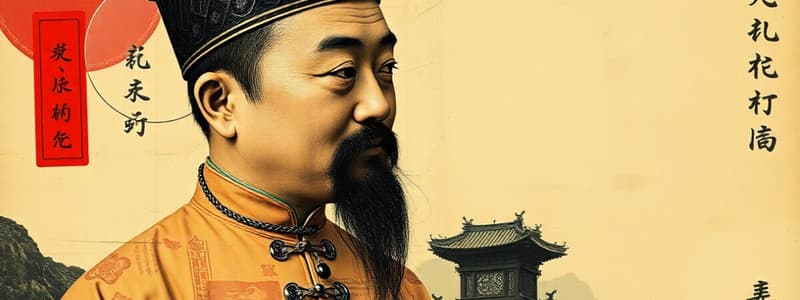Podcast
Questions and Answers
Analyze the Qing emperor's initial reaction to Western technology presented by England. What does this reveal about China's perception of its own self-sufficiency and its place in the world at the time?
Analyze the Qing emperor's initial reaction to Western technology presented by England. What does this reveal about China's perception of its own self-sufficiency and its place in the world at the time?
The Qing emperor was unimpressed, believing China already possessed everything needed, highlighting a perception of self-sufficiency and superiority.
Explain how China's agricultural economy, specifically the adoption of new crops from the Americas, contributed to its ability to resist trade with the West. How did these crops affect China's population?
Explain how China's agricultural economy, specifically the adoption of new crops from the Americas, contributed to its ability to resist trade with the West. How did these crops affect China's population?
The introduction of maize, sweet potatoes, and peanuts increased land productivity and fed China's population, reducing reliance on foreign goods. This self sufficiency meant they didn't have to engage in trade with the West.
How did the British use the opium trade to reverse the trade imbalance with China, and what were the long-term social and economic consequences of this trade for Chinese society?
How did the British use the opium trade to reverse the trade imbalance with China, and what were the long-term social and economic consequences of this trade for Chinese society?
British merchants smuggled opium into China, creating addiction and demand, reversing the trade imbalance. This led to widespread addiction as well as social and economic instability.
Explain the significance of extraterritorial rights granted to foreigners in China after the Opium War. How did these rights undermine Chinese sovereignty and contribute to anti-foreign sentiment?
Explain the significance of extraterritorial rights granted to foreigners in China after the Opium War. How did these rights undermine Chinese sovereignty and contribute to anti-foreign sentiment?
Describe the goals of the Taiping Rebellion and explain why it ultimately failed. What impact did the rebellion have on the Qing Dynasty and China's internal stability?
Describe the goals of the Taiping Rebellion and explain why it ultimately failed. What impact did the rebellion have on the Qing Dynasty and China's internal stability?
Analyze Empress Dowager Cixi's approach to reform in China. To what extent did her policies address the internal and external challenges China faced, and what were their limitations?
Analyze Empress Dowager Cixi's approach to reform in China. To what extent did her policies address the internal and external challenges China faced, and what were their limitations?
Detail the Open Door Policy proposed by the United States. How did this policy aim to balance the interests of various foreign powers in China while protecting U.S. trading rights?
Detail the Open Door Policy proposed by the United States. How did this policy aim to balance the interests of various foreign powers in China while protecting U.S. trading rights?
What were the main causes and objectives of the Boxer Rebellion, and what does the rebellion reveal about Chinese attitudes towards foreign influence and Christian missionaries?
What were the main causes and objectives of the Boxer Rebellion, and what does the rebellion reveal about Chinese attitudes towards foreign influence and Christian missionaries?
Compare and contrast the strategies employed by China and Japan in response to Western influence during the 19th century. How did their differing approaches shape their respective trajectories in the modern world?
Compare and contrast the strategies employed by China and Japan in response to Western influence during the 19th century. How did their differing approaches shape their respective trajectories in the modern world?
Describe the events and outcomes of the Russo-Japanese War? What did this war reveal about Japan's rise to power and its ambitions in Asia?
Describe the events and outcomes of the Russo-Japanese War? What did this war reveal about Japan's rise to power and its ambitions in Asia?
Flashcards
Opium War
Opium War
A conflict in 1839 between Britain and China, caused by British trade of opium in China. China lost due to outdated ships.
Extraterritorial Rights
Extraterritorial Rights
Rights granted to foreign citizens, exempting them from local laws in Guangzhou and other Chinese ports.
Taiping Rebellion
Taiping Rebellion
A mid-19th century rebellion against the Qing Dynasty in China, led by Hong Xiuquan, aiming for a 'Heavenly Kingdom of Great Peace'.
Spheres of Influence
Spheres of Influence
Signup and view all the flashcards
Open Door Policy
Open Door Policy
Signup and view all the flashcards
Boxer Rebellion
Boxer Rebellion
Signup and view all the flashcards
Meiji Era
Meiji Era
Signup and view all the flashcards
Treaty of Kanagawa
Treaty of Kanagawa
Signup and view all the flashcards
Annexation
Annexation
Signup and view all the flashcards
Russo-Japanese War
Russo-Japanese War
Signup and view all the flashcards
Study Notes
- Chinese pride in their ancient culture led them to look down on foreigners
- In 1793, the Qing emperor received an ambassador from England, who gave clocks, globes, musical instruments, and a hot-air balloon as gifts
- The emperor was not impressed because the Chinese felt they had everything they needed
China's Self-Sufficiency
- China rejected offers from the West because of its self-sufficiency
- A healthy agricultural economy was the basis of this self-sufficiency
- China acquired a quick-growing strain of rice from Southeast Asia during the 11th century
- By the Qing Dynasty, rice was grown throughout southern China
- In the 17th and 18th centuries, maize, sweet potatoes, and peanuts were brought from the Americas by Spanish and Portuguese traders
- China's land productivity increased from these crops
- Mining and manufacturing industries included rich salt, tin, silver, and iron mines producing ore
- The mines provided work for tens of thousands of people
- High-quality cottons, fine porcelain, and silks were also produced
The Tea-Opium Connection
- Chinese self-sufficiency resulted in minimal interest in trading with the West
- For decades, the southern port of Guangzhou was the only place for foreigners to do business
- The balance of trade at Guangzhou was in China's favor
- China made more on exports than it spent on imports
- European merchants wanted to find a product the Chinese would buy in large quantities and they found opium
- Opium is a habit-forming narcotic made from the poppy plant
- Chinese doctors had been using it for pain relief for hundreds of years
- In the late 18th century, British merchants smuggled opium into China for nonmedical use
Studying That Suits You
Use AI to generate personalized quizzes and flashcards to suit your learning preferences.




